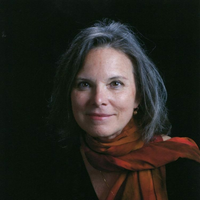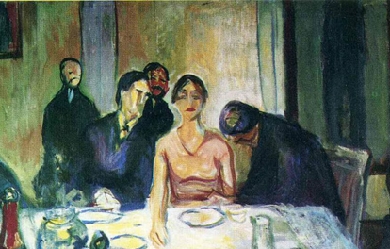Travel Papers
Au silence de celle qui laisse rêveur.
—René Char
By boat to Seurasaari where
the small fish were called vendace.
A man blew a horn of birchwood
toward the nightless sea.
Still voice. Fire that is no fire.
Ahead years unknown to be lived—
Bells from the tower in the all-at-once, then
one by one, hours. Outside
(so fleetingly) ourselves—
In a still mirror, in a blue within
where this earthly journey dreaming
itself begins,
thought into being from the hidden to the end of the visible.
Mountains before and behind,
heather and lichen, yarrow, gorse,
then a sea village of chartreuse fronds.
Spent fuel, burnt
wind, mute swans.
We drove the birch-lined
highway from Dresden
to Berlin behind armored
cars in late afternoon,
nineteenth of June, passing
the black cloud of a freight
truck from Budapest.
Through disappearing
villages, past horses grazing vanished fields.
The year before you died, America
went to war again on the other
side of the world.
This is how the earth becomes,
you said, a grotto of skeletons.
In the ruins of a station: a soaked
bed, broken chairs, a dead coal stove.
White weather, chalk and basalt,
puffins, fuchsia and history shot
through with particles
of recognition: this one
wetted down with petrol then
set alight, that one taking
forty rounds, this other
found eleven years later in a bog.
In the station house, imaginary
maps, smoke chased by wind, a registry
of arrivals, the logs of ghost
ships and a few prison
diaries written on tissue paper.
Do you remember the blue-leaved lilies?
The grotto, the hoarfrost, the frieze?
Through the casements of glass hand-blown
before the war, a birch tree lets snow drop
through its limbs onto other birches. Birch twigs
in wind through glass.
Who were we then? Such
a laughter as morning peeled
its light from us!
You said the cemeteries were full in a voice
like wind plaiting willows—fields in bloom
but silent without grasshoppers or bees.
What do you want then? You with your
neverness, your unknown,
your book of things, you
with once years ahead to be lived.
Your father believes he took you
with him, that you are
in an urn beside your sleeping mother
but I am still writing with your hand,
as you stand in your still-there of lighted words.
Such is the piano’s sadness and the rifle’s moonlight.
Stairwells remember as do doors, but windows do not—
do not, upon waking, gaze out a window
if you wish to remember your dream
An ache of hope that you will come back—
the cawing flock is not your coming.
Did you float toward Salzburg? A wind
in the mustard fields?—or walk instead
beside me through the asylum in Krakow?
Hours after your death you seemed
everywhere at once like the swifts at twilight.
Now your moments are clouds
in a photograph of swifts.
In the hour held
open between day and night under
the meteor showers of Perseid
we held each other for the last time.
Dead, you whispered where is the road?
There, through the last of the sentences, just there—
through the last of the sentences, the road—


